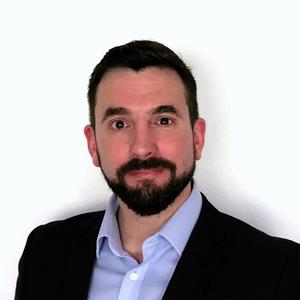“Approach your WFM career with the same adaptability you learned in the military”
News
- Professional Performance
10 April 2025

Last year we launched the Veterans in WFM Network, a dedicated career route for veterans to network and support each other in their workplace and facilities management (WFM) careers. Click here to discover how veterans can find pathways to success in WFM. Veterans possess an array of skills, experiences and ambitions, so we’re keen to highlight individuals from this rich talent pool to better understand their different WFM paths.
One such individual is Adam Phillips, Sales Director at Pareto FM, who served in the Royal Air Force. Adam discussed his unconventional early experience in WFM, how networking has enhanced his career prospects and the importance of embracing change.
Could you briefly outline your Military background and areas of expertise?
I joined the Royal Air Force in 1997 as a trainee Engineering Technician (Airframe). After my training, I was posted to RAF Bruggen in Germany, working on Tornado GR1/4 aircraft. Later, I transferred to 28(AC) Squadron at RAF Benson, maintaining the Merlin Mk3 helicopter. I deployed to Bosnia and Iraq during this time. Throughout my service, I gained qualifications in mechanical, systems, and controls engineering.
What prompted your transition from the Military to WFM?
The primary motivation was the birth of my eldest son. Balancing family life with the extensive travel demands of military service became increasingly difficult. I left the RAF in 2005. Interestingly, even though I didn’t have direct WFM experience, volunteering at Glastonbury Festival, helping to set up and run the Pyramid Stage facilities, provided some relevant skills. I also became fascinated by the mechanical systems in buildings, especially HVAC, which reminded me of the aircraft systems I was used to working on.
Which transferable skills and experiences proved most valuable in your WFM career?
My RAF engineering qualifications provided a solid foundation. Learning to work with people from diverse backgrounds towards a shared goal has been invaluable in the people-oriented WFM industry. The discipline and adaptability instilled by the military are also essential, as no two days are the same and unexpected challenges frequently arise.
How did you network and build connections within WFM industry?
Networking became crucial when I transitioned from a commissioning engineer to a management role. Attending IWFM events in London connected me with future colleagues. It wasn't until the creation of the IWFM Veterans Network that my veteran status demonstrably opened doors and provided opportunities, although I believe it has always helped me build credibility.
Networking has been my biggest tool for career growth. I've built a strong network of senior colleagues across WFM, which has helped me progress. Cultural fit is paramount when choosing an employer, and I recommend researching beyond company websites and press releases to gain genuine insights.
What advice would you give to other military service leavers or veterans considering a career in WFM?
Choose a job, an employer, and a building you genuinely enjoy working with. Don't be afraid of change - approach your WFM career with the same adaptability you learned in the military.
WFM is unpredictable, demanding agile thinking, which the military instils. The scenario training ingrained in the RAF, constantly preparing for worst-case scenarios, has been incredibly valuable in WFM.
Can you share a personal anecdote highlighting the differences or similarities between military life and working in WFM?
The biggest difference was the commute! No longer a five-minute walk to work. I now use that time to catch up on emails or listen to built environment podcasts. A key similarity is the importance of standards. Professionalism, attention to detail, and accurate record-keeping are crucial, just as they were in the military.
How has your experience in WFM contributed to your personal and professional growth since leaving the military?
WFM has provided me with a fantastic career, allowing me to solve challenges in remarkable buildings, giving me a great sense of achievement. I've built a strong network, formed genuine friendships, and benefited from mentorship and leadership development. It's a challenging, rewarding industry with many opportunities to grow and the skills gained in the military translate extremely well.
To find out more about Veterans In FM’s work, click here or visit us on LinkedIn.
